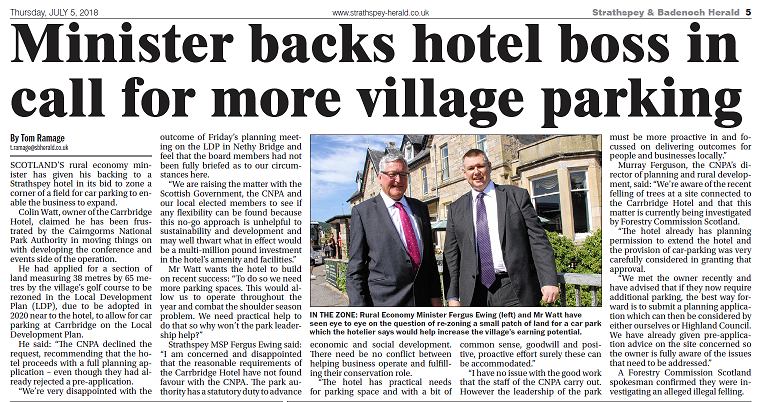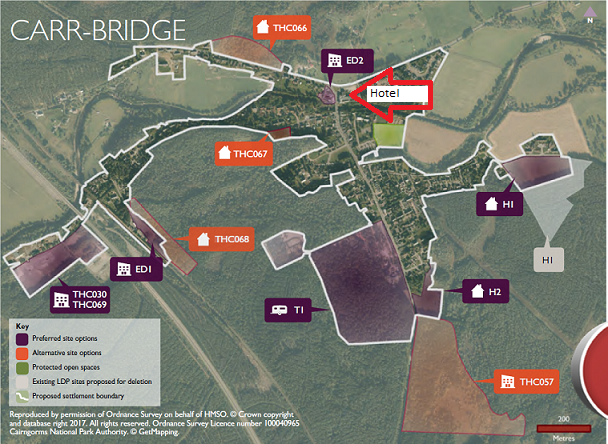 At the end of June the Cairngorms National Park Authority Planning Committee considered the responses to its public consultation on Local Development Plan, the Main Issues Report, which has previously been covered on Parkswatch (see here for example). There were 331 responses and these are summarised and considered in a 247 page report to the Committee (link to documents here). The responses raise many issues, from the local to those of national importance, and some of considerable complexity. There will be no-one will agree with ALL the decisions made the CNPA Planning Committee as a consequence but the process to adopt a new Local Development Plan still has a considerable way to go with further public consultation and then scrutiny by the Scottish Government. I explain all this to put into context Fergus Ewing’s public intervention (see above) in support of just one business a few days later.
At the end of June the Cairngorms National Park Authority Planning Committee considered the responses to its public consultation on Local Development Plan, the Main Issues Report, which has previously been covered on Parkswatch (see here for example). There were 331 responses and these are summarised and considered in a 247 page report to the Committee (link to documents here). The responses raise many issues, from the local to those of national importance, and some of considerable complexity. There will be no-one will agree with ALL the decisions made the CNPA Planning Committee as a consequence but the process to adopt a new Local Development Plan still has a considerable way to go with further public consultation and then scrutiny by the Scottish Government. I explain all this to put into context Fergus Ewing’s public intervention (see above) in support of just one business a few days later.
The piece of land which Colin Watt, the owner of the Carrbridge Hotel, wished to have re-zoned for “parking” comprises bog and trees and has recently been felled by the owner. Mr Watt explained this as follows in his response to the Main Issues Report (331CarrbridgeHotel response MIR) which, like other responses, was published on the CNPA website:

Whether Mr Watt was aware that these trees had been felled without a licence and therefore illegally is unclear. Whatever the case Mr Watt, who says in his response he has an agreement with the owner about using this land in future, could not create a car park here………or the houses he also wants to build ………….unless the trees had been felled.
Felling licences are issued by Forestry Commission Scotland, hence their investigation, which Mr Ewing is responsible for as Cabinet Secretary for the Rural Economy. He has therefore in effect, through backing Mr Watt’s proposal, endorsed the illegal felling of trees. Perhaps he wasn’t aware of this? Whether he was or wasn’t merits an investigation under the Ministerial Code of Conduct (see here) and the FCS now needs to make transparent both its investigations in this case and the basis on which it decides on what enforcement action to take.

Mr Ewing has also however effectively tried to drive a coach and horses through the Local Development Plan process in order to benefit one constituent. The area which Mr Watt wants included in the Local Development Plan is labelled THC066 and lies north and west of the Carrbridge Hotel. This area lies outwith the settlement boundary (the white line) shown in the Main Issues Report. Agreeing settlement boundaries is key to prevent settlement sprawl and effectively marks a green belt around each community in the National Park which protects the amenity of local residents. Changing settlement boundaries should therefore require very careful consideration but Mr Ewing apparently want the CNPA to change the boundary just like that to benefit one local business.
While the Strathy article quotes Mr Watt as saying the area would be used for additional car parking for the hotel, Mr Watt’s response to the Main Issues Report also says he wants to construct 10-12 “Town Home apartments” of 2-3 bedrooms for hotel staff. While everyone knows that affordable housing in the National Park is a major issue, there are two reasons to be sceptical about Mr Watt’s proposal. The first is the last published accounts of the Carrbridge Hotel state that on average they employ 29 staff, so the proposal looks more than what is required to provide sufficient affordable housing. The second is that there is already more than enough land allocated for housing in Carrbridge.
There were 151 responses to the section in the Main Issues Report on Carrbridge and most of these were to express concern about the number of houses proposed for development site HI (on right of map above). In the Main Issues Report the CNPA had already proposed reducing the area of this development site (as marked on the map) to conserve woodland. As a result of the consultation the the recommendation to the Planning Committee was that the number of houses could be reduced to 36 because there is sufficient capacity to meet demand in the area. Its a well argued case and undermines Mr Watt’s argument that a new site is needed to house his staff: the way to do this would be to increase the percentage of affordable housing on the land already allocated for housing within Carrbridge, as has happened in other communities like Braemar. Doing so, incidentally, would mean that staff were not dependent on Mr Watt for their housing.
There are also reasons to be sceptical about Mr Watt’s argument that the land is needed for car parking at the hotel. In 2016 the Carrbridge Hotel applied for and was given permission to extend the hotel into the current parking area by building another 24 bedrooms thus reducing its size. Highland Council Planners approved the plans to extend the hotel despite some very well argued submissions from local people (see here for one) first that the hotel had ignored planning requirements in respect of the car park for a number of years (with rubbish etc stored in the car parking area) and second that the capacity was not sufficient. Instead they found:
“The applicant submitted supporting information, both with this application and the earlier 2016 submission, indicating that the operation of the hotel is largely coach based. Following detailed assessment of this information, along with further clarification and additional information from the applicant, the Transport Planning team has concluded that the proposed level of car parking is sufficient to service the requirements of the hotel.”
What this suggests is that Mr Watt, or his agents at the time, appear to have told planners that car park capacity at the hotel was sufficient to enable planning consent for the extension to go ahead (one of the most frequent reasons for refusing developments is inadequate car parking). He now appears to be saying the opposite.
The CNPA’s response to Mr Watt’s representations was clearly set out in the report to the Planning Committee:
THC066 is a boggy wooded piece of land with deep peat. It has significant constraints that mean it cannot be relied upon to deliver housing. With respect to the proposals from respondent 331, which only affect part of the site, the development of housing here is considered inappropriate as it would have a significant negative effect on the landscape of the locality and the setting of the village and golf course. An LDP allocation for car parking is also unlikely to be appropriate. This element of the proposal would be better dealt with through the submission of a planning application, where any proposals will be judged on its merits through the development management process.
What the last sentence effectively says is that if Mr Watt needs a temporary parking area while the hotel extension is being built that he should submit a planning application for this to go ahead (on the land where the trees have been felled) but the area is not appropriate for permanent development. In my view that was absolutely the right response to make.
Mr Watt however is not happy with this decision and has gone to Mr Ewing as his local MSP, as is his right, but then Mr Ewing has been foolish enough to wade in before checking the facts and tried to hammer the Cairngorms National Park Authority (once again) in public. Given Mr Ewing’s power its commendable staff have stood their ground and the CNPA Board needs to too.
“Integrity” is one of the 7 principles that apply to those holding positions in public life, including Scottish Ministers:
“Holders of public office must avoid placing themselves under any obligation to people or organisations that might try inappropriately to influence them in their work. They should not act or take decisions in order to gain financial or other material benefits for themselves, their family, or their friends. They must declare and resolve any interests and relationships.”
No ordinary member of the public could go to their MSP and within a week get them to criticise a public authority in a case like this. Most MSPs are very cautious in such cases and write to public authorities first to find out what is happening. It is reasonable to conclude therefore that there is some sort of relationship between Mr Watt and Mr Ewing which has enabled Mr Watt to promote his particular case ahead of the 330 or so other respondents to the Main Issues Report. Mr Ewing should be asked to explain what that interest is and how his intervention accords with the behaviour we should expect of Scottish Ministers.
The much wider issue is the extent to which this type of unwarranted political interference nfluences what happens in our National Parks and other Public Authorities.
Mr Ewing MSP is a nasty, he demonstrated that when he minister for Energy etc. He like Grayling in Westminster, will run with hare or hounds ….
Ewing has proven in the past to be a complete arsehole on rural affairs, he is quite obviously pro landowners and gamekeepers. Ewing is reputed to have said that “wolves and lynx will introduced into Scotland over his dead body” earlier in the year. This shows as far as I am concerned that conservation is well down his list of priorities or his limited intellect. Since devolution none of the administrations have been up to scratch but this lot are a disaster as far as I am concerned.
An excellent and balanced criticism of Fergus Ewing’s behaviour on this issue, Nick. Unfortunately, as you allude to, this is not the first time Fergus Ewing has inappropriately tried to influence the Cairngorms National Park Authority. One example I have is written evidence (obtained via an FOI) of what in my view is inappropriate and undue pressure being applied by Fergus Ewing on the CNPA Planning Authority over the Beachen Court housing development in Grantown on Spey. The email Ewing sent to Grant Moir (CNPA Chief Executive) can only be described as an ill-informed (arguably even bullying) rant unbefitting of an MSP far less a Cabinet Secretary. Grant Moir replied responsibly, unfortunately actions speak louder than words and what followed was in my opinion an unhealthy and surprising rush by the CNPA Planning Authority to accede to Fergus Ewing’s demands, including knowingly permitting the developer to commence site work in clear breach of planning conditions.
Maybe we should be compiling a portfolio of similar examples to support an investigation of Fergus Ewing MSP under the Ministerial Code of Conduct.